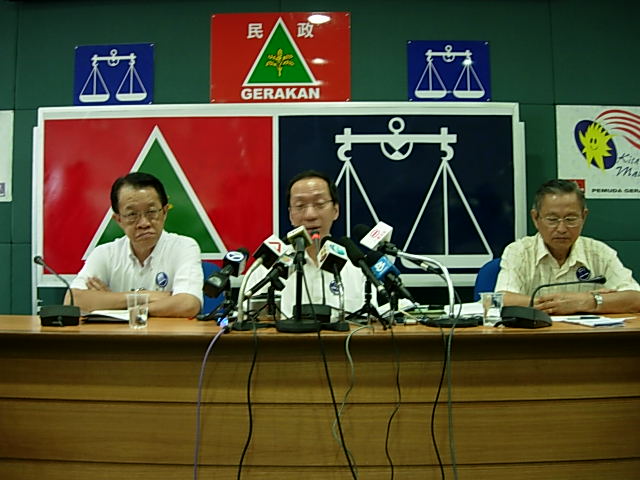By Jacqueline Ann Surin
jacquelinesurin@malaysiavotes.com
PENANG: Gerakan acting president and outgoing Penang chief minister Tan Sri Dr Koh Tsu Koon has refuted the opposition’s charge that Umno dominates the Barisan Nasional (BN), especially in this northern state.
Presenting statistics at a press conference here on March 4, he said the number of constituencies that have been allocated to Umno since 1984, and the number of exco positions held by Umno in the state government, compared to the non-Umno component parties in the BN proved that power-sharing in Penang was “genuine, equitable and fair”.

In 1982, Gerakan, the MCA and MIC had 17 of the 27 Penang state assembly seats, while Umno had 10 seats.
Koh said after the 1984 delineation exercise in the state, the number of seats in the state assembly increased from 27 to 33. Of the additional six seats, two were allocated to Umno, three to Gerakan and one to the MCA. Koh noted that while Umno had two additional seats, the non-Umno component parties had four.
In 2003, following another delineation exercise, the number of seats increased from 33 to 40. Of the seven additional seats, three went to Umno, two to Gerakan and one each to the MCA and MIC.
Koh said that the non-Umno component parties had four new seats compared to Umno’s three but this was also to reflect the change in demographics arising from the increase in the Malay population.
He said Umno held 15 out of 40 seats, which constituted 37.5% of the state assembly, after the 2004 elections. “Isn’t that a fair distribution of seats when the Malay population in Penang is about 40%?” he told reporters at the Penang Gerakan headquarters on Macalister Road after presenting the statistics.
(The Chinese constitute 44% to 45% of Penang’s population, the Indians between 8% and 9%, and the rest are Others.)
Koh said the distribution of seats demonstrated that no one BN component party was dominant in Penang.

Koh was responding to the Opposition’s argument that it was important for voters to deny the BN a two-thirds majority in the state in the 2008 general election to prevent any future re-delineation of seats that would favour Umno.
The number of state seats is determined by the state constitution, which can only be amended with a two-thirds majority.
“The Opposition’s argument is that if voters deny the BN a two-thirds majority, it will reduce further Umno’s dominance,” Koh said, adding that this was a “very misleading argument”.
He said the DAP, which has teamed up with Parti Keadilan Rakyat (PKR) to win big in Penang in this election, was just trying to scare voters and it was not right that they were trying to “whip up fear among the Chinese and Indians”.
“Even in the state exco, there are only four Umno exco members, while the remaining seven, including the chief minister, are from non-Umno component parties,” Koh said.
“The Opposition is stirring up feelings unnecessarily but the facts and figures speak for themselves,” he added.
To a question whether Umno would be entitled to more seats if the Malay population increased in proportion, Koh said any delineation exercise would have to respect changes in demographics in the long term.
“But this does not mean that the number of seats would change to such a high degree,” he said, noting that it would take a long time to reverse the 25:15 ratio of non-Umno to Umno seats in the state assembly.
To another question, he said his projection was meant for the 2008 election and the next delineation exercise. But when pushed further, Koh said, the current ratio “could be sustained for a long time”.
“Please don’t just look at it from just a Chinese angle. I’m talking about fair and equitable distribution of seats,” Koh said.
“If we want to argue along racial lines, then Umno and the Malays can also argue that 37.5% of seats is not fair (because they make up 40% of the population),” he said, imploring everyone to “please think as Malaysians”.
“Any increase in the number of Umno seats will be proportionate and fair,” he added.
When it was pointed out that Umno strongholds were sometimes significantly smaller in population size then the Opposition areas, and hence lent Umno a strategic advantage, Koh said no country, even in Britain, could have equal numbers of people in each constituency.
The Umno stronghold of Kepala Batas has 43,018 voters, Tasek Gelugor 44,466, Nibong Tebal 47,540 and Balik Pulau 39,765, compared with the DAP’s stronghold Bagan, which has 59,385 voters, Bukit Mertajam 64,080, Tanjong 53,188, and Bukit Gelugor 65,614.
In Permatang Pauh, where PKR is defending the only seat it won in the 2004 election, there are 58,449 voters.
Koh said many of the Umno seats were rural seats and hence were smaller in population size to enable the Member of Parliament to better serve the people.